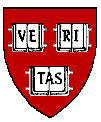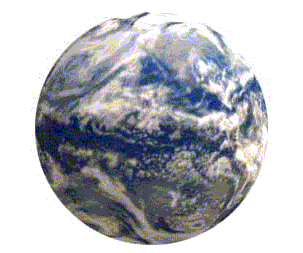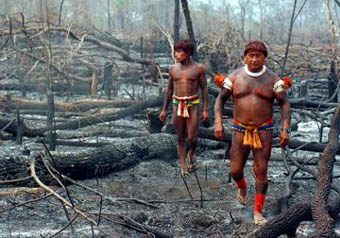


|
The Harvard Seminar on Environmental ValuesSeminar Theme 1999-2000
The Land Ethic Revisited: Ownership, Stewardship and Moral Responsibility in an Ecosystem
|

|

[ Bottom of page | Environmental Ethics & Public Policy
Research Program Home Page | 1999-2000 Seminar Schedule |
Archive of 1998-1999 Seminars |
Archive of 1997-1998 Seminars |
Archive of 1996-1997 Seminars |
Center for the Study of
Values in Public Life Home Page
Divinity School Home
Page
| Harvard Home Page ]
In 1949, Aldo Leopold wrote an essay entitled "The Land Ethic" which appeared as the last chapter in his famous work, A Sand County Almanac. In this essay he expressed the thought that ethical systems evolve as human communities extend their sense of responsibility. As he put it:
Fifty years after these words were written, we would do well to reflect upon them with an eye to discerning whether or not we have made siginificant progress in developing "the land ethic" of which Leopold wrote so passionately. Is it still true in 1999, as Leopold asserted in 1949, that: "There is as yet no ethic dealing with man's relation to land...."?"The extension of ethics, ...is actually a process in ecological evolution. Its sequences may be described in ecological as well as in philosophical terms....
The first ethics dealt with the relations between individuals....Later accretions dealt with the relation between the individual and society....
There is as yet no ethic dealing with man's relation to land and to the animals and plants which grow upon it. Land...is still property. The land-relation is still strictly economic, entailing privileges but not obligations.
The extension of ethics to this third element in human environment is, if I read the evidence correctly an evolutionary possibility and an ecological necessity. It is the third step in a sequence. The first two have already been taken. Individual thinkers since the days of Ezekiel and Isaiah have asserted that the despoliation of the land is not only inexpedient but wrong. Society, however, has not yet affirmed their belief. I regard the present conservation movement as the embryo of such an affirmation."
Are lone voices like Ezekiel and Isaiah still "crying in the wilderness?" Are their numbers at least more numerous? What prevents them from being heard? If "society" is not yet guided by a land ethic, what has prevented this ethic from emerging, as Leopold thought it would, through the embryonic "conservation movement"? What does it require to move from lone voices of outrage, protest and judgment to effective public policy that could foster a collective sense of a meaningful land ethic? More fundamentally, what might a true land ethic look like? Can humans really "own" land? What can social conventions of ownership effectively mean in an ecosystem characterized by process and constant change? If concepts of ownership are of limited use, are we, instead, "stewards" of the land? If so, on whose behalf? What responsibilities do we as humans have to land in a sustainable ecosystem?
These and many other questions will serve as the basis for our collective reflections this year in the Seminar Series as scientists, humanists, policy makers, businessmen and public leaders gather each month to exchange views on what Aldo Leopold called "an evolutionary possibility and an ecological necessity" -- a land ethic.

Day Event Time and Location or
Contact Information
Fall Semester 1999
October 28
ThursdayHarvard Seminar on Environmental Values
J. Baird Callicott, Professor of Philosophy, University of North Texas -- "Reading A Sand County Almanac." (Some Readings and Resources).For information
contact Tim Weiskel
tel. 496-5208
November 17 Wednesday
Harvard Seminar on Environmental Values
Dr. David R. Foster, Director, The Harvard Forest, Petersham, Massachusetts -- "Thoreau's Country and the Restoration of the New England Landscape."
For information
contact Tim Weiskel
tel. 496-5208
December 15 Wednesday
Harvard Seminar on Environmental Values
Dianne Dumanoski, Investigative Science Journalist and Environmental Writer. "From the Land Ethic to the Uncharted Territory of Global Humanity." (Some Readings and Resources).
For information
contact Tim Weiskel
tel. 496-5208
Spring Semester 2000
February 15
TuesdayHarvard Seminar on Environmental Values
Wes Jackson, President, The Land Institute, Salina, Kansas. "Clear-Cutting the Last Wilderness: Compromising the Genomes of Our Major Crops." (Readings and Research Resources).For information
contact Tim Weiskel
tel. 496-5208
March 21
TuesdayHarvard Seminar on Environmental Values
Professor Joan Martinez-Alier, Professor, Department of Economics and Economic History, Universitat Autonoma de Barcelona, Spain; Visiting Fellow, Program in Agrarian Studies, Yale University, "Environmental Justice, Sustainability and Valuation."For information
contact Tim Weiskel
tel. 496-5208
April 18
TuesdayHarvard Seminar on Environmental Values
Richard H. Grove, Institute of Advanced Studies, Australian National University, Canberra, Australia, "The Culture of Islands and the History of Environmental Concern."For information
contact Tim Weiskel
tel. 496-5208
Archive of 1998-1999 Seminar Meetings | Archive of 1997-1998 Seminar Meetings | Archive of 1996-1997 Seminar Meetings
To receive further information about the Harvard Seminar on Environmental Values or to offer suggestions to us click here to enter your specific request or suggestions.
Or for further information on specific programs or activities of the Harvard Seminar on Environmental Values contact :
Dr. Timothy C. Weiskel
Director, Harvard Seminar on Environmental Values
56 Francis Avenue
Cambridge, MA 02138
or call:
tel. 617-496-5208

[ Top of page
| Environmental Ethics and Public Policy Research Program Home Page
| Center for the Study of Values in Public Life Home Page
| Divinity School Home Page
| Harvard Home Page ]
